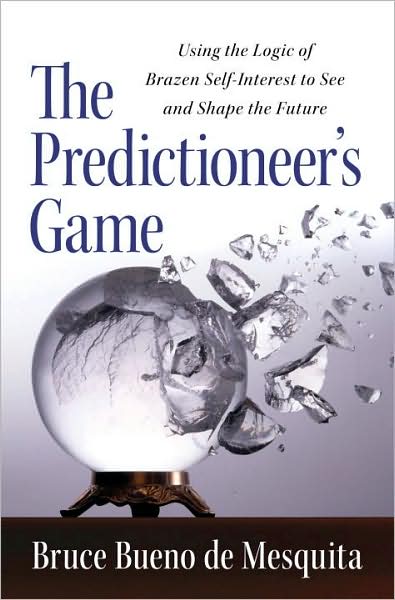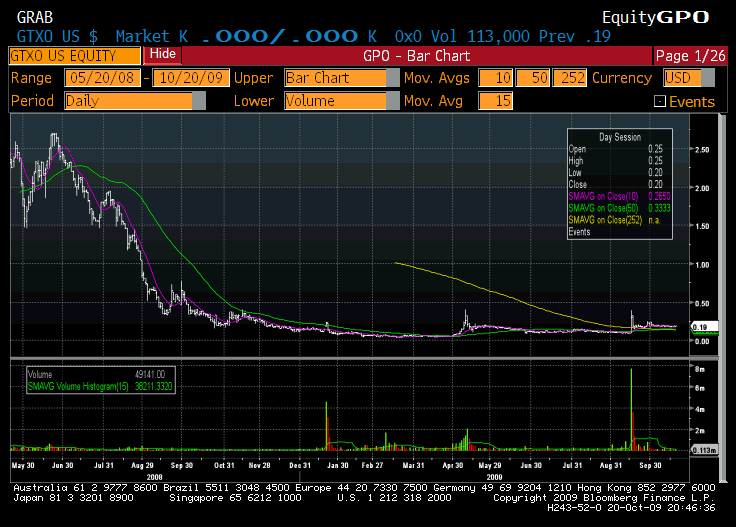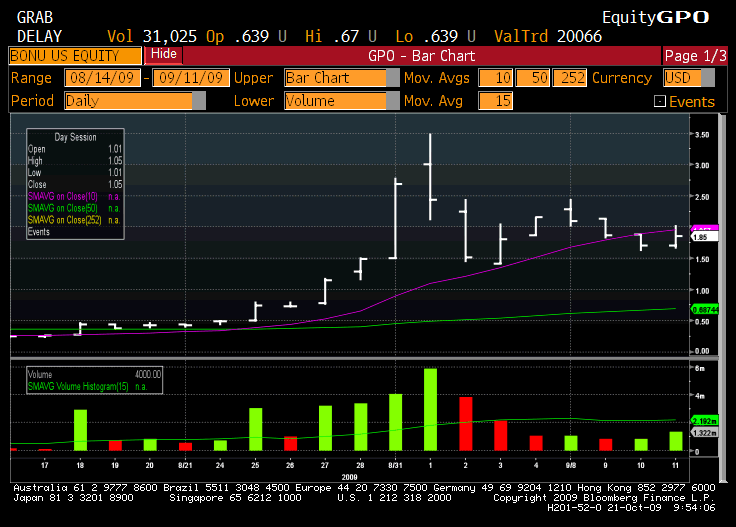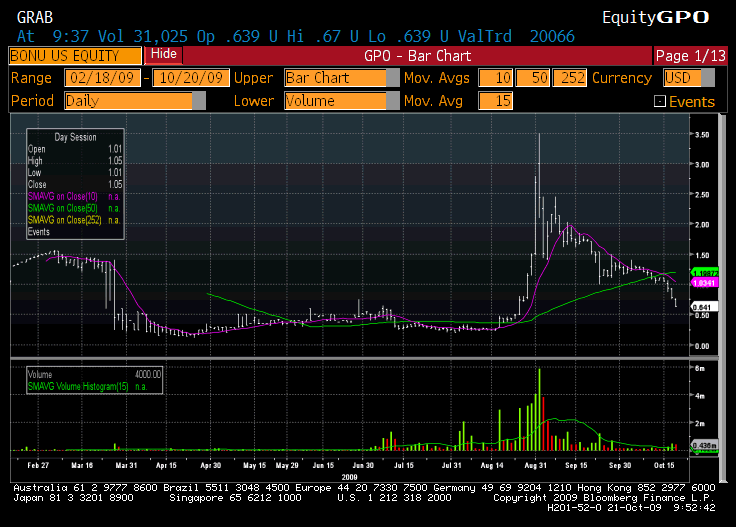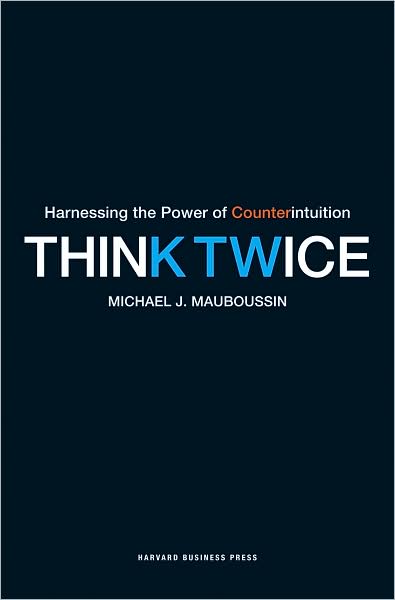After the last article on this topic, you would think that they would take me off of the mailing list.? But no.? Wait!? How did GTX Corp do after I wrote my article?

In short, when I wrote, the price went down temporarily, and then rebounded as the flyer advertising GTX circulated among the uneducated masses.? Since that time, the price is down ~90%.
If the advertising group pushing GTX Corp had any self-awareness, you would think they would take me off of their mailing list.? Sad to say, I have a new microcap stock to share with you:? Bonanza Goldfields Corp. [BONZ]
In an era where many fear inflation, an appeal to gold has credibility, and could draw those who think they missed out on the move upward.? The flyer has many evocative images — gold coins, gold bars, etc.? The aura of wealth is palpable.? They appeal to the troubles at present, and suggest that gold is the solution, and that the price of gold will rise as a result.
Because I don’t want to be sued, I am not identifying the researchers — I call them ABC and XYZ.
They give the sense that there are very promising finds of gold to be made from Bonanza Goldfields.? These claims are made in big type, while in small type, the following is written (yes, no paragraphing):
IMPORTANT DISCLAIMER: This paid advertising issue of ABC Research (hereafter “ABC Research”) does not purport to provide an analysis of any company’s financial position and is not in any way to be construed as an offer or solicitation to buy or sell any security. ABC Research is a paid advertiser. OTCBB: BONZ is the featured company. XYZ Inc managed the publishing and distribution of this publication. XYZ Inc is a financial communications media company that disseminates information via paid advertisements. Although the information contained in this advertisement is believed to be reliable, XYZ Inc and its editors make no warranties as to the accuracy of the description of any of the content herein. The information contained herein is being republished from publicly disseminated information issued by third parties regarding BONZ and are presumed to be reliable, but neither XYZ Inc Inc or their editors accept any responsibility for the accuracy of such information. Neither XYZ Inc, nor any of their principals, officers, directors, partners, agents, or affiliates are not, nor do we represent ourselves to be, registered investment advisors, brokers, or dealers in securities. Readers should independently verify all statements made in this advertisement. XYZ Inc, as well as various affiliated companies and vendors have received and managed a total production budget of $1,300,000 for this advertising effort and will retain, over and above the cost of production and publication, any amounts that remain as additional compensation for production services relating to the advertising and publishing efforts. This advertisement was not paid for by BONZ or its management. Please make special note that XYZ Inc, their respective principals, officers, directors, shareholders, stakeholders, creditors, partners, agents, or affiliates own shares of BONZ and intend to sell all of their shares in any company profiled at any time, be that before the date of a profile, during the date of a profile, or at any time after the date of a profile, as has been the practice of XYZ Inc, and their related parties on many previous occasions. Past performance does not guarantee future results. The information contained herein contains forward looking information within the meaning of Section 27 A of the Securities Act of 1933 and Section 21 E of the Securities Exchange Act of 1934, including statements regarding expected continual growth of the featured company. The information contained herein includes forward-looking statements within the meaning of the “safe harbor” provisions of the Private Securities Litigation Reform Act of 1995. Reference is made in particular to the description of BONZ’s plans and objectives for future operations, assumptions underlying such plans and objectives and other forward-looking statements included in the information provided. Such statements, which contain terms such as “expect”, “believe”, “anticipate”, “suggest”, “plan”, “indicate” and similar terms of uncertainty, are based on management’s current expectations and beliefs and are subject to a number of factors and uncertainties which could cause actual results to differ materially from those described in the forward-looking statements. All statements relating to operational results are hereby qualified in their entirety by the company’s filings, including its financial statement filings, under the Securities Exchange Act of 1934. Do not base investment decisions on this advertisement. We assume no responsibility for any use or misuse of this material. Consult your investment advisor and do your own due diligence before making any investment in this or any other securities. This report is for INFORMATIONAL PURPOSES ONLY? THIS IS NOT INVESTMENT ADVISE!!!
The grammatical and other errors in the statement are theirs.? But what do we learn from it?
- This isn’t a security analysis, much as it would appear to be otherwise.
- ABC Research paid $1.3 million to distribute this advertising.? BONZ did not pay.
- XYZ owns shares of BONZ, and may sell them at any time.? They have done so with prior companies advertised in the past.
What we don’t learn is what relationship ABC has to XYZ.? I can find ABC on the web, but I can’t find XYZ.? My guess is that ABC and XYZ are affiliates, but I can’t prove that.? Otherwise, why would ABC pay so that XYZ could benefit from the $1.3 million payment, as well as sell into a rising market for their shares?
The “important disclaimer” was printed in teensy 5 1/2 point type in long lines, making it difficult to read.? They weren’t interested in giving clarity.? Where did they offer clarity?? In the big type, often with special coloration or highlighting:
- OTCBB: BONZ? This GOLD stock is SET to SKYROCKET!!! BONZ could bring up to 600% to your portfolio in the next two weeks.? PULL UP STOCK QUOTE NOW
- ABC’s latest stock profile featured OTCBB: BONU? The stock skyrocketed from $0.25 to $3.5 for two weeks in August 2009.? OTCBB: BONZ will be an even bigger winner.
- OTCBB: BONZ BONANZA GOLDFIELDS CORP.? THE NEXT BIG GOLD STOCK PICK WITH 200-500% UPSIDE POTENTIAL!
- GOLD IS AT ALL TIME HIGH We believe that gold will hit $2000 per ounce soon and we believe that OTCBB: BONZ will follow the Gold Trend an could hit $2 PER SHARE!!
- OTCBB: BONZ COULD BE ONE OF THE TOP GOLD PLAYS OF 2009
- BONZ means $$$$ for your portfolio and HUGE profits!!!
- Buy OTCBB: BONZ TODAY, IT’S WORTH MORE THAN GOLD!!
- AGGRESSIVE BUY & HOLD TO $2.90
There’s more, but that’s most of what they wrote in big type to attract the attention of people.? In medium sized-type, the analyst/advertiser spins a tale of how this company has promising land, mainly located in Arizona, where they have done some assays and found some gold, silver, lead, zinc, and copper.? They claim to have an experienced team of people to exploit the resource.
BioNeutral
Before I deal with BONZ, what of the stock BONU that they predicted such gains on — gains that BONZ will exceed?? They included a graph that looked like this for readers:

The company’s name is BioNeutral Group, Inc. Their corporate decription reads as follows:? BioNeutral Group, Inc.manufactures specialty chemicals.? The Company produces chemicals that can neutralize environmental contaminants, toxins, bacteria, viruses, and spores.
But why show such a small graph?? How has BioNeutral Group, Inc. done over the last 12 months?

My, but that was selective.? If I may, it looks like ABC’s report led to a temporary bump in BONU, much as it did for GTXO.? My guess is that better informed people who know the promotion is going on profit at the expense of the rubes who believe their report.? I have not researched BioNeutral, but my guess would be that the stock price would continue to decline, like that of GTXO.
So what of Bonanza Goldfields?
I went and grabbed the 10-K, and the S-1 from their IPO in 2008.? That’s one of the first things anyone should do in a case like this.? What do we learn?
- Their auditor is not a major auditor, but they still could not issue a “going concern” opinion for the last two years.
- The firm has negative net worth and negative net working capital.
- The firm has one asset valued at $99,000, their mining claim, and petty cash.
- They have no revenues, and have lost money for the past two years.
- They do not have the resources to explore/exploit their mining claim.
- From the S-1:? We currently have no employees except the board of directors and officers. We have no employees other than our officer and director as of the date of this prospectus. Our board members currently devotes approximately 5 hours per week to company matters and after receiving funding, they plan to devote as much time as the Board of Directors determines is necessary to manage the affairs of the company. There are no formal employment agreements between the company and our current employees. We conduct our business largely through consultants.
- From the 10-K: As of fiscal year end June?18, 2009 the Company had 1 employee.
- From the S-1: During the period ended June 18, 2008, the Company granted to members of the Board of Directors, 6,997,900 shares of common stock valued in the aggregate at $69,979, for service rendered to the Company outside of their responsibilities as members of the Board of Directors and were valued concurrent with maximum price the common stock was sold in a private placement.
During the period ended June 18, 2008, the Company issued 3,302,100 shares of its common stock for $85,000. The shares were issued to third parties in a private placement of the Company?s common stock. ?The shares were sold throughout the period ended June 18, 2008, at a range between $.01 – .02 per share. (DM: giving them a small gain.)
- The risk factors are voluminous, consistent with a company that doesn’t have much going on.
- None of the Board of Directors have any experience in mining listed; the advertisement suggests extensive management experience (over 120 years), though it is silent about mining management experience.
- Officers own 66% of the firm, as of the date of the 10-K.
- There are three entities that have provided the financing: Gold Exploration LLC, who sold them the parcel, and gets some royalties.? Taylor Invest & Finance and Venture Capital International have provided financing, and were sellers of shares at the IPO (look at page 11 — also note that there are multiple entities selling stock controlled by the same people.? Odd.)
- Bonanza Goldfields raised no proceeds in the IPO.
- I’m not sure I am reading it right, but it looks like Taylor Invest & Finance and Venture Capital International would end up with a large amount of the company if they converted their financing to shares.? The wording is vague.
- I also can’t explain why “In June?2008 a total of 3,302,100 common shares were sold?to public non-U.S. investors, for an average price of $0.026 per share.”? These same shareholders sold it all for the same price in April of 2009.? The only possible benefit I can see is that it somehow cements relationships with Taylor Invest & Finance and Venture Capital International.
- They entered into more financing arrangements with Taylor Invest & Finance, and Advantage Systems Enterprises Limited (another seller at the IPO).
- They split the stock 7 for 1.
- From the 10-K: At June?18, 2009, there were 72,100,000 shares of common stock of Bonanza outstanding and there were approximately 21 shareholders of record of the Company?s common stock. That is a small number for just having done an offering, particularly when the S-1 said there were just 19 shareholders then.
This filing may connect Mr. Vippach of Venture Capital International and a Mr. Soullier, who might be related to the 40% owner Rose Marie Soullier.? That’s just a curiosity, though; I have no idea if it means something.
The stock did not start trading until May 5th, 2009, long after the IPO in September 2008. It traded around 65 cents a share, a considerable amount above the IPO price.? The current price of 30-33 cents gives the firm a market cap of around $18 million.? Off of the recent financings, they are looking to explore their mining interests.? They have also bought two more interests.? They have enlisted Gold Exploration LLC to help them analyze the property.? (Why should Gold Exploration LLC sell property to them, and then help them analyze it?? Weird.)? Also odd is the cancellation of shares of the #2 shareholder, seemingly for no compensation.? Gold Exploration, LLC, or at least Steve Karolyi, a co-founder, has had dealings with three other microcap miners, Mariposa Resources, Firstar Exploration Corporation, and Zone Mining (now delisted).? I don’t have enough data to say whether it seems fishy or not.
Summary:
There’s a lot of weird stuff here, and a lot of stuff that I don’t know:
- How does a company with practically no assets, no revenues, and a negative net worth support a $18 million market cap?
- How are ABC and XYZ related?? What does ABC Research get out of this?
- Do they have any relationship with BONZ, or those with economic interests in BONZ?
- How much of BONZ does XYZ own?
- How are the various financiers related?
- Is Gold Exploration LLC just a service provider?
- The advertisement offers no justification for its target prices.
- The advertisement uses gold as a hook, because it is hot now.
Note: here is a penny stock feed complete with twitter: they think it is going up.? I would, too, looking at the charts, and looking at the advertisement.? But I can’t speculate on stuff like this; it’s unethical.? Stay away — do not go long or short.
As I closed the prior piece — Buyer beware, and don?t listen to strangers giving you advice.? Cultivate networks of knowledgeable friends who are trustworthy, and avoid getting taken for a ride by slick-talking (writing) hucksters who pitch clever ideas to you.? Do your work, and buy cheap, boring ideas like I do.
-=-==-=-=-=–==-=-=-
One note in passing: shouldn’t the SEC have some interest in this sort of advertising?? I mean, at least have a rule that says that legal disclaimers must be in type larger than the largest font size otherwise in the document, and with no other alterations to affect readability.? Then perhaps it would be harder to fool people through advertising that pretends to be research.
Full disclosure:? No positions in any securities mentioned.? This is my opinion only, and not that of my employer.? I’m only interested in honesty in the markets.
| OTCBB: BONZ BONANZA GOLDFIELDS CORP.? THE NEXT BIG GOLD STOCK PICK WITH 200-500% UPSIDE POTENTIAL! |


